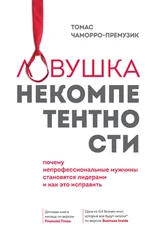«Лидеры пятого уровня: триумф скромности и жесткой решительности». Октябрь 2006 г. Классика HBR.
С подробным обсуждением значения прогнозируемого намерения можно познакомиться в: G. D. Reeder, “Mindreading: Judgments About Intentionality and Motives in Dispositional Inference,” Psychological Inquiry 20, no. 1 (2009): 1–18.
B. S. Connelly and D. S. Ones, “An Other Perspective on Personality: Meta-analytic Integration of Observers’ Accuracy and Predictive Validity,” Psychological Bulletin 136, no. 6 (2010): 1092–122.
Проверьте сами: спросите у друзей, каким они вас видят, и вы убедитесь, что по большому счету они единодушны, даже если вы не согласны с их мнением.
Кули Ч. Х. Человеческая природа и социальный порядок. М.: Идея-Пресс, 2000.
G. H. Mead and D. L. Miller, The Individual and the Social Self: Unpublished Work of George Herbert Mead (Chicago: University of Chicago Press, 1982), 5.
M. Leary, “Motivational and Emotional Aspects of the Self,” Annual Review of Psychology 58 (2007): 317–44.
J. S. Beer and D. Keltner, “What Is Unique About Self-Conscious Emotions?” Psychological Inquiry 15, no. 2 (2004): 126–70.
A. H. Baumgardner, C. M. Kaufman, and P. E. Levy, “Regulating Affect Interpersonally: When Low Esteem Leads to Greater Enhancement,” Journal of Personality and Social Psychology 56, no. 6 (1989): 907–21.
R. F. Baumeister, “A Self-Presentational View of Social Phenomena,” Psychological Bulletin 91, no. 1 (1982): 3–26.
L. H. Somerville, W. M. Kelley, and T. F. Heatherton, “Self-esteem Modulates Medial Prefrontal Cortical Responses to Evaluative Social Feedback,” Cerebral Cortex 20, no. 12 (2010): 3005–13.
T. Sharot, C. W. Korn, and R. J. Dolan, “How Unrealistic Optimism Is Maintained in the Face of Reality,” Nature Neuroscience 14, no. 11 (2011): 1475–79.
24 мая 2006 г. за это реалити-шоу проголосовало 63 млн человек – почти на 10 млн голосов больше, чем получил Рональд Рейган на выборах 1984 г.
C. U. Greven, N. Harlaar, Y. Kovas, T. Chamorro-Premuzic, and R. Plomin, “More Than Just IQ: School Achievement Is Predicted by Self-Perceived Abilities – But for Genetic Rather Than Environmental Reasons,” Psychological Science 20, no. 6 (2009):753–62; T. Chamorro-Premuzic, N. Harlaar, C. U. Greven, and R. Plomin, “More Than Just IQ: A Longitudinal Examination of Self-Perceived Abilities as Predictors of Academic Performance in a Large Sample of UK Twins,” Intelligence 38, no. 4 (2010): 385–92.
T. Chamorro-Premuzic and A. Furnham, Personality and Intellectual Competence (Mahwah, NJ: Lawrence Erlbaum Associates, 2005).
Я вовсе не желаю оскорбить одну из икон современного корпоративного мира, просто констатирую факт: Марк Цукерберг производит впечатление человека, вполне осознающего границы своих лидерских способностей, с учетом того, что он взял на пост главного операционного директора великолепную Шэрил Сэндберг (ранее бывшую вице-президентом Google). И все же не могу не сказать, что рыночная оценка Facebook больше относится к вопросам уверенности, чем компетентности.
T. Chamorro-Premuzic and A. Furnham, The Psychology of Personnel Selection (New York: Cambridge University Press, 2010).
R. Hogan and R. Kaiser, “How to Assess Integrity,” Consulting Psychology Journal (готовится к выходу).
Chamorro-Premuzic, Personality and Individual Differences .
“Strategic Consulting,” Gallup, http://www.gallup.com/consulting/52/employee-engagement.aspx/.
J. Hillard and E. Pollard, Employability: Developing a Framework for Policy Analysis (Nottingham, UK: Department of Education and Employment, 1998).
“Civilian Labor Force Participation Rate,” Bureau of Labor Statistics, http://data.bls.gov/timeseries/LNS11300000years_option=specific_years&include_graphs=true&to_month=1&from_month=2.
“The Joyless or the Jobless,” Economist, November 25, 2010.
Y. Baruch and N. Bozionelos, “Career Issues,” in Handbook of Industrial and Organizatio nal Psychology, Vol. 2, ed. S. Zedeck (Washington, DC: American Psychological Association, 2011), 67–133.
Chamorro-Premuzic and Furnham, Personality and Intellectual Competence.
T. Chamorro-Premuzic and A. Furnham, “Intellectual Competence and the Intelligent Personality: A Third Way in Differential Psychology,” Review of General Psychology 10, no. 3 (2006): 251–67.
C. Mueller and C. Dweck, “Praise for Intelligence Can Undermine Children’s Motivation and Performance,” Journal of Personality and Social Psychology 75, no. 1 (1998): 33–42.
Гладуэлл М. Гении и аутсайдеры. Почему одним все, а другим ничего? М.: Манн, Иванов и Фербер, 2013.
A. K. Ericsson, N. Charness, P. Feltovich, and R. R. Hoffman, The Cambridge Handbook of Expertise and Expert Performance (Cambridge, UK: Cambridge University Press, 2006).
B. Tulgan, Winning the Talent Wars: How to Build a Lean, Flexible, High-Performance Workplace (New York: W. W. Norton, 2001).
P. Brown and A. Hesketh, The Mismanagement of Talent: Employability and Jobs in the Knowledge Economy (Oxford, UK: Oxford University Press, 2004), 153.
R. Hogan, T. Chamorro-Premuzic, and R. Kaiser, “Employablity: Who Can Get and Keep a Job?” Perspectives of Industrial-Organizational Psychology (готовится к выходу).
Ibid.
Gallup, “Strategic Consulting.”
«Лидеры пятого уровня: триумф скромности и жесткой решительности». Октябрь 2006 г. Классика HBR.
Читать дальше
Конец ознакомительного отрывка
Купить книгу







![Марк Макгиннесс - Несмотря ни на что [Как преодолеть страх, неприятие и критику на пути к своей мечте]](/books/393908/mark-makginness-nesmotrya-ni-na-chto-kak-preodolet-thumb.webp)




